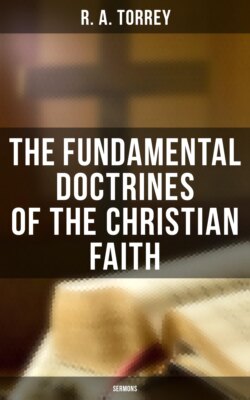Читать книгу The Fundamental Doctrines of the Christian Faith (Sermons) - R. A. Torrey - Страница 11
На сайте Литреса книга снята с продажи.
VII. ALL SCRIPTURE IS INSPIRED OF GOD
ОглавлениеTable of Contents
The seventh thing that the Bible makes plain regarding the work of the Holy Spirit in the various writers of Scripture, is that all Scripture, that is everything contained in all the books of the Old and New Testament, is inspired of God. We are distinctly taught this in 2 Tim. 3:16, 17. Here we read, "All Scripture (more exactly, every Scripture) is given by inspiration of God (more literally, God-breathed), and is profitable for doctrine, (or teaching), for reproof, for correction, for instruction in righteousness (rather, instruction which is in righteousness), that the man of God may be perfect (rather, complete) thoroughly furnished (better, furnished completely) unto all good works (rather, every good work)." An attempt has been made to obscure the full force of these words by a revised translation given in both the English Revision and American Standard Version. In this revised translation, the words are rendered as follows: "Every Scripture inspired of God is also profitable for teaching, for reproof, for correction, for instruction which is in righteousness; that the man of God may be complete, furnished completely unto every good work." There is absolutely no warrant in the Greek text for changing "Every Scripture is given by inspiration of God and is profitable for doctrine, etc.," into "Every Scripture inspired of God is also profitable for teaching, etc." "Every" is in the Greek. There is no "is" in the Greek. It must be supplied, as is often the case in translating from Greek into English. "Is" must be supplied somewhere, either before "given by inspiration" (or God-breathed), or else supplied after it, in the latter case necessitating the change of "and" into "also" (a change which is possible, but very uncommon); and there is not a single instance in the New Testament outside of this in which two adjectives coupled by the simplest copulative "and (kai)" are ripped apart and the "is" placed between them and an "and" changed into "also." The other construction, that of the Authorised Version, is not at all uncommon. The translation of the Revisers does violence to all customary usage of the Greek language. But we do not need to dwell upon that, for, even accepting the changes given in the Revision, the thought is not essentially changed; for if Paul had said what the revisers make him say that "Every Scripture inspired of God is also profitable for teaching, etc.," there can be no question but by "every scripture inspired of God" he referred to every Scripture contained in the Old Testament. Here, then, taking whichever translation you will, we have the plain teaching that every Scripture of the Old Testament is "God-breathed" or "inspired of God." Certainly if we can believe this about the Old Testament there is no difficulty in believing it about the New, and there can be no question that Paul claimed for his own teaching an equal authority with the O. T. teaching. This we shall see clearly under the next head. And not only did Paul so claim, but the Apostle Peter also classes the teaching of Paul with the O. T. teaching as being "Scripture." Peter says in 2 Pet. 3:15, 16, "Even as our beloved brother Paul also, according to the wisdom given unto him, wrote unto you; (16) as also in all his epistles, speaking in them of these things, wherein are some things hard to be understood, which the ignorant and unstedfast wrest, as they do also the other Scriptures, unto their own destruction." Here Peter clearly speaks of Paul's epistles as being "Scripture."
